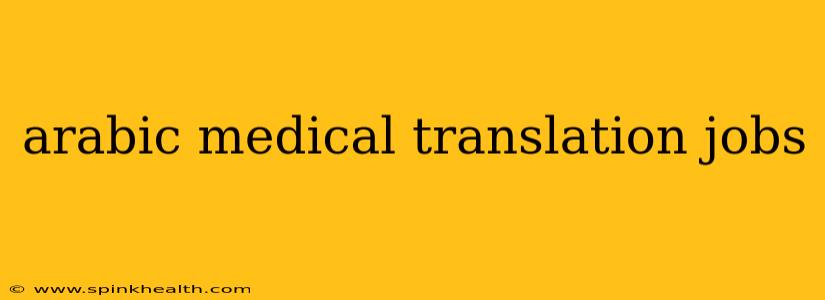Navigating the World of Arabic Medical Translation Jobs: A Story of Precision and Passion
The world of healthcare is global, and bridging the language gap is crucial for effective communication and quality patient care. This is where the vital role of Arabic medical translation comes into play. It's not just about converting words; it's about conveying the nuances of complex medical information accurately and ethically, impacting lives along the way. This journey into the field of Arabic medical translation will uncover the opportunities, challenges, and rewards awaiting those with the passion and expertise to excel.
What are the key skills needed for Arabic medical translation jobs?
This isn't just about knowing Arabic and English. Imagine you're translating a complex oncology report. You need more than just linguistic fluency; you need deep medical knowledge. Picture this: I once worked with a translator who mistook a specific type of chemotherapy for another, resulting in a serious misunderstanding. This highlighted the absolute necessity for specialized medical knowledge paired with linguistic skill. The key skills include:
- Fluency in Arabic and English: This is the foundation, but it goes beyond simple conversation. It's about mastery of medical terminology in both languages.
- Deep medical knowledge: Understanding medical concepts, procedures, and terminology is non-negotiable. Specialization within a medical field (cardiology, oncology, etc.) is a significant advantage.
- Translation expertise: This goes beyond simple word-for-word translation. It's about conveying meaning accurately, considering cultural nuances and adapting the style for the target audience.
- Attention to detail: Accuracy is paramount. A single misplaced word or misinterpreted term can have severe consequences.
- CAT tools proficiency: Computer-Assisted Translation (CAT) tools significantly enhance efficiency and consistency. Familiarity with tools like SDL Trados or MemoQ is highly advantageous.
What qualifications are needed for Arabic medical translation jobs?
The path to becoming a successful Arabic medical translator usually involves a combination of education and experience. Many professionals hold degrees in translation, interpretation, or a relevant medical field. Advanced degrees, such as a Master's in Translation Studies with a focus on medical terminology, often provide a competitive edge. Relevant experience, even volunteer work or internships, is invaluable. Certifications in medical translation can boost credibility and demonstrate a high level of competency.
What are the different types of Arabic medical translation jobs available?
The opportunities are diverse and span various sectors:
- Healthcare providers: Hospitals, clinics, and pharmaceutical companies frequently need translators for patient records, research papers, and clinical trial documentation.
- Medical device companies: These companies require translators for product manuals, marketing materials, and regulatory submissions.
- Pharmaceutical companies: Translating drug information, clinical trial reports, and marketing materials is vital for global pharmaceutical operations.
- Research institutions: Arabic medical translation is crucial for disseminating research findings and facilitating collaboration in international research projects.
- Legal firms: Medical legal cases often require highly specialized Arabic medical translation services.
- Freelance work: Many translators choose the freelance route, offering their services to a variety of clients.
How much do Arabic medical translation jobs pay?
The earning potential varies significantly depending on factors such as experience, specialization, and location. Highly specialized translators with extensive experience can command premium rates. Freelancers have more control over their rates but also bear the responsibility of finding their clients. It's a field where experience and proven expertise translate directly into increased earning potential.
Where can I find Arabic medical translation jobs?
Job boards specializing in translation and interpretation often list relevant vacancies. Networking within the medical and translation communities is also beneficial. Directly contacting healthcare providers, pharmaceutical companies, and research institutions can lead to opportunities. Freelancing platforms provide access to a wider range of clients, but careful vetting is necessary to ensure ethical and reliable work.
The world of Arabic medical translation is a field of profound impact. It’s a career where precision and passion combine to improve lives and bridge crucial communication gaps within the global healthcare landscape. It's a journey that demands dedication, expertise, and an unwavering commitment to accuracy, but the rewards—both personal and professional—are immense.

